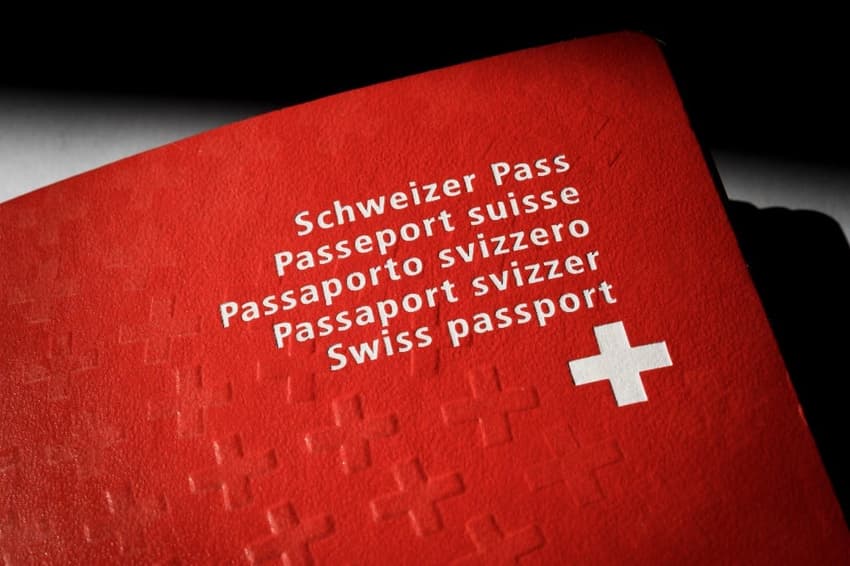What we know about dual nationals living in Switzerland

Nearly a fifth of the country’s residents have two citizenships — Swiss and another one. Here’s what we know about them.
On Monday, The Local published an article about a Swiss MP who is trying to ban dual nationals from running for the parliament, claiming that they “don’t represent Switzerland’s best interests”.
One deputy, Yvonne Feri, who holds both a Swiss and Italian passport, replied that the parliament “is a reflection of Switzerland, where nearly 25 percent of the population has foreign roots”.
First: What is ‘dual nationality’?
When foreigners receive a citizenship of their country of residence while still maintaining the nationality of their place of origin, they become known as ‘dual nationals’.
Both countries consider these people as their citizens and neither regards them as foreigners.
FSO said that for statistical purposes, “dual nationals are considered as Swiss”.
How many dual nationals are there in Switzerland?
The latest FSO figures are from 2018, but the situation has not changed significantly since then.
People aged 15 or over with dual citizenship represent 18 percent of Switzerland’s permanent resident population – 967,000 people in total.
Most come from neighbouring countries: 24 percent from Italy, 12 percent from France, and 9 percent from Germany.
The table below shows where the other dual nationals come from.

READ MORE: EXPLAINED: What's the difference between permanent residence and Swiss citizenship?
How did these people get their Swiss citizenship?
According to FSO, 65 percent obtained Swiss nationality through naturalisation, while 35 percent acquired it at birth.
“This situation is particularly marked among Kosovars, Serbians and North Macedonians with dual citizenship”, FSO explained.
“More than 90 percent of people within these populations obtained Swiss nationality through naturalisation. In contrast, for French, Italian or British dual nationals, the percentages of individuals who obtained Swiss nationality at birth and of those who obtained dual citizenship through naturalisation are more similar. Swiss-French dual nationals are the only ones among whom more individuals obtained Swiss nationality at birth rather than through naturalisation — 58 percent compared with 42 percent”.
What is the advantage of dual nationality?
The most obvious benefit is the ability to live and vote in both countries, without having to give up any rights in either.
The only exception may be American citizens, a number of whom are giving up their US passports after being naturalised in Switzerland. They take this drastic step to avoid paying taxes in the United States.
The US is the only industrialised country in the world that taxes its overseas citizens. This practice places a double financial burden on them of having to pay taxes in their country of residence as well as in the United States.
That is why many Americans who have dual nationality opt to give up their US passports.
Comments
See Also
On Monday, The Local published an article about a Swiss MP who is trying to ban dual nationals from running for the parliament, claiming that they “don’t represent Switzerland’s best interests”.
One deputy, Yvonne Feri, who holds both a Swiss and Italian passport, replied that the parliament “is a reflection of Switzerland, where nearly 25 percent of the population has foreign roots”.
First: What is ‘dual nationality’?
When foreigners receive a citizenship of their country of residence while still maintaining the nationality of their place of origin, they become known as ‘dual nationals’.
Both countries consider these people as their citizens and neither regards them as foreigners.
FSO said that for statistical purposes, “dual nationals are considered as Swiss”.
How many dual nationals are there in Switzerland?
The latest FSO figures are from 2018, but the situation has not changed significantly since then.
People aged 15 or over with dual citizenship represent 18 percent of Switzerland’s permanent resident population – 967,000 people in total.
Most come from neighbouring countries: 24 percent from Italy, 12 percent from France, and 9 percent from Germany.
The table below shows where the other dual nationals come from.

READ MORE: EXPLAINED: What's the difference between permanent residence and Swiss citizenship?
How did these people get their Swiss citizenship?
According to FSO, 65 percent obtained Swiss nationality through naturalisation, while 35 percent acquired it at birth.
“This situation is particularly marked among Kosovars, Serbians and North Macedonians with dual citizenship”, FSO explained.
“More than 90 percent of people within these populations obtained Swiss nationality through naturalisation. In contrast, for French, Italian or British dual nationals, the percentages of individuals who obtained Swiss nationality at birth and of those who obtained dual citizenship through naturalisation are more similar. Swiss-French dual nationals are the only ones among whom more individuals obtained Swiss nationality at birth rather than through naturalisation — 58 percent compared with 42 percent”.
What is the advantage of dual nationality?
The most obvious benefit is the ability to live and vote in both countries, without having to give up any rights in either.
The only exception may be American citizens, a number of whom are giving up their US passports after being naturalised in Switzerland. They take this drastic step to avoid paying taxes in the United States.
The US is the only industrialised country in the world that taxes its overseas citizens. This practice places a double financial burden on them of having to pay taxes in their country of residence as well as in the United States.
That is why many Americans who have dual nationality opt to give up their US passports.
Join the conversation in our comments section below. Share your own views and experience and if you have a question or suggestion for our journalists then email us at [email protected].
Please keep comments civil, constructive and on topic – and make sure to read our terms of use before getting involved.
Please log in here to leave a comment.